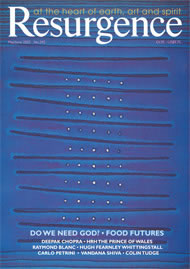THIS BOOK WAS the result of many years’ yearning. A longing for something whose character I perceived only indistinctly at first but which gradually became clearer during my journeys. I was looking for a quality of wildness, which, like art, sex, love and all the other intoxicants, has a rising swing ringing through it. A drinker of wildness, I was tipsy with it before I began and roaring drunk by the end.
I felt its urgent demand in the blood. I could hear its call. Its whistling disturbed me by day and its howl woke me in the night. I heard the drum of the sun. Every path was a calling cadence, the flight of every bird a beckoning, the colour of ice an invitation: come. Every mountain top intrigued my mind, for the wind at the peaks was the flautist, licking his lips, dangerously mesmerising me with almost inaudible melodies. This was the calling, the vehement, irresistible demand of the feral angel – take flight.
I was looking for the will of the wild. I was looking for how that will expressed itself in elemental vitality, in savage grace. Wildness is resolute for life: it cannot be otherwise for it will die in captivity. It is elemental: pure freedom, pure passion, pure hunger. It is its own manifesto.
So I began this book with no knowing where it would lead, no idea how hard some of it would be, the days of havoc and the nights of loneliness, because the only thing I had to hold onto was the knife-sharp necessity to trust to the elements my elemental self.
I took seven years over this work; spent all I had: my time, money and energy. Part of the journey was a green riot and part a deathly bleakness. I got ill; I got well. I went to the freedom fighters of West Papua and sang my head off in their highlands. I got to the point of collapse. I got the giggles. I met cannibals infinitely kinder and more trustworthy than the murderous missionaries who evangelise them. I went to places which are about the worst in the world to get your period. I wrote notes by the light of a firefly; anchored a boat to an iceberg where polar bears slept; ate witchetty grubs and visited sea gypsies. I found a paradox of wildness in the glinting softness of its charisma, for what is savage is in the deepest sense gentle and what is wild is kind. In the end – a strangely sweet result – I came back to a wild home.
From shamans in the Amazon I learnt something of how the wastelands of the mind, its dark depressions, could be navigated, and from them I learnt to see the world through the eyes of a jaguar. From Inuit people in the Arctic I learnt something of the intricate ice and how all landscape is knowledgescape. From whales and dolphins I learnt how much we do not know, the octaves of possibilities, the maybes of the mind. From Aboriginal people in Australia I learnt the belowness of deserts, how land is heavy with significance and how it sings. From West Papuan people I learnt how freedom is the absolute demand of the human spirit. Everywhere, too, I learnt of songlines, how people who know and love a land can hold it in mind as music.
To me, the human spirit is one of the most striking realisations of wildness. It is as eccentrically beautiful as an ice crystal, as liquidly life-generous as water, as inspired as air. Kernelled up within us all, an intimate wildness, sweet as a nut. For us all, every dawn, the lucky skies and the pipes. Anyone can hear them if they listen. We are – every one of us – a force of nature, though sometimes it is necessary to relearn consciously what we have never quite forgotten: the truant art, the nomad heart.
I was, in fact, homesick for wildness, and when I found it I knew how intimately – how resonantly – I belonged there. We all do. For the human spirit has a primal allegiance to wildness, to really live, to snatch the fruit and suck it, to spill the juice. We may think we are domesticated but we are not. Feral in pheromone and intuition, feral in our sweat and fear, feral in tongue and language. This is the first command: to live in fealty to the feral angel.
Wild: An Elemental Journey is published by Tarcher in the USA. Jay Griffiths is also the author of Pip Pip: A Sideways Look At Time.






